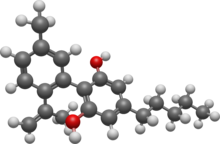Cannabinodiol (CBND), also known as cannabidinodiol,[1] cannabinoid that is present in the plant Cannabis sativa at low concentrations.[2] It is the fully aromatized derivative of cannabidiol (CBD) and can occur as a product of the photochemical conversion of cannabinol (CBN).[3]
 | |
 | |
| Clinical data | |
|---|---|
| ATC code |
|
| Legal status | |
| Legal status |
|
| Identifiers | |
| |
| CAS Number | |
| PubChem CID | |
| ChemSpider | |
| UNII | |
| CompTox Dashboard (EPA) | |
| Chemical and physical data | |
| Formula | C21H26O2 |
| Molar mass | 310.437 g·mol−1 |
| 3D model (JSmol) | |
| |
| |
See also
editReferences
edit- ^ US 9084771, McAllister SD, Desprez PY, "Methods and compositions for treating cancer", published 21 July 2015, assigned to Sutter West Bay Hospitals
- ^ Ch Lousberg RJ, Bercht CL, van Ooyen R, Spronck HJ (1 January 1977). "Cannabinodiol: Conclusive identification and synthesis of a new cannabinoid from Cannabis sativa". Phytochemistry. 16 (5): 595–597. Bibcode:1977PChem..16..595R. doi:10.1016/0031-9422(77)80023-X.
- ^ Elsohly MA, Slade D (December 2005). "Chemical constituents of marijuana: the complex mixture of natural cannabinoids". Life Sciences. Natureceuticals (Natural Products), Nutraceuticals, Herbal Botanicals, and Psychoactives: Drug Discovery and Drug-Drug Interactions; Volume I: Natureceuticals (Natural Products), Herbal Botanicals, Psychoactive Hallucinogens and Related Products. 78 (5): 539–548. doi:10.1016/j.lfs.2005.09.011. PMID 16199061.